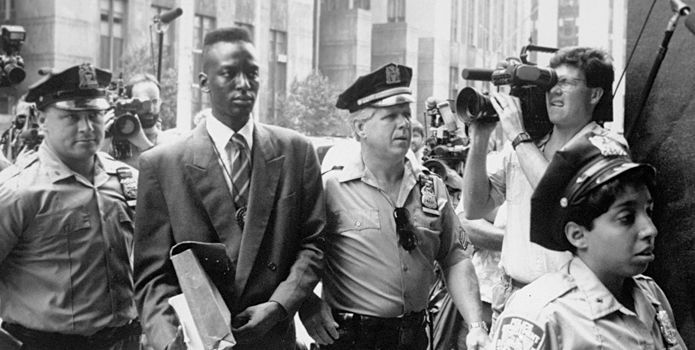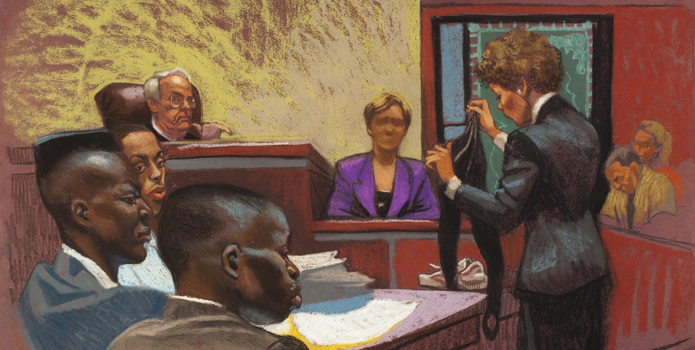Amir here looking at two films we should keep an eye on in Oscar's documentary race.
 "The Central Park Five"
"The Central Park Five"
I’ll be the first to admit that when it comes to judging the quality of documentaries, I have a particular bias. My favourite docs tend to be innovative films that aren’t necessarily “significant” in the grand scheme of things, like Grizzly Man or Senna, but I often find myself giving a pass to films that use a conventional structure to tell an important story, merely because the subject matter does the work, towering above the film itself. Every once in a while, however, I’m confronted with a film that utilizes the old “talking heads intercut with archival footage” formula so powerfully that it becomes impossible to imagine it in any other way. Two such films came my way during TIFF that absolutely blew me away.
The first is Ken Burns, Sarah Burns and David McMahon’s The Central Park Five, which tells the story of five black and Latino youths who were arrested in 1989 for the alleged rape and physical abuse of a white female jogger in Central Park. Despite a lack of evidence to support the charges and their youth (they were all between 14 and 17), they each ended up serving several years in prison or juvenile detention centres. In 2002, more than a decade after their first trial, the real criminal stepped out and confessed; DNA evidence supported his claim. But the irreversible damage had been done. [more after the jump...]
The filmmakers interview the five victims, tracking their lives from the night of the crime to the moment of their release and in this straightforward and tidily edited vision lies the strength of the film. The experience of listening to these men talk about their unjustly stolen youth is painful enough, but being presented with archival footage that shows the inconsistencies in evidence that the prosecutors chose to ignore is gut-wrenching.

The most harrowing thing about the film is that it shows us how little we’ve progressed in the past 23 years. Coming on the back of cases like Trayvon Martin and Chavis Carter, this exposé of the failings of the American judicial system and its treatment of racial minorities is as timely as ever. The media, too, is still quick to sensationalize stories like these at the expense of someone's or even a whole community’s life. Sadly for the victims, their vindication never got as intense a news coverage as their initial arrests.
Many pundits believe The Central Park Five is the frontrunner for this year’s best documentary Oscar and I can see why. It checks every box I can think of: artfully made, socially conscious, and lands on the zeitgeist more than any other doc this year.
Less obvious as an Oscar contender, but no less engaging and disturbing is The Gatekeepers. Directed by Dror Moreh, this film is comprised of a series of interviews with six former heads of Shin Bet, the Israeli national security agency. These men have never been interviewed in the media before but Moreh isn’t satisfied with his unprecedented level of access. Whatever techniques he uses in his interviews – we don’t hear his questions for the most part, only their answers – gives him a level of disclosure that is truly astonishing.

Succumbing to their own logic that “every Israeli is a leftist liberal after retirement,” these men, who start out by justifying the actions they took when in charge, end up admitting that many of their practices were beyond any bounds of moral behaviour. That might sound reductive and one-sided, but it shouldn’t. Many documentaries have been made about the long-standing crisis in the Middle East, but few of them have stayed so far away from propaganda. The Gatekeepers does, and it’s a breath of fresh air.
Stretching all the way back to the 1967 border designation and following the conflict through decades, The Gatekeepers inquisitively revisits the assassinations of Yitzhak Rabin and Sheikh Yasin, the Oslo accords and many other events that have turned into major obstacles on the path to peace. With one shocking revelation after another, Moreh draws a portrait of these men that feels at once incredibly distant to the audience from the brutality on display, and equally intimate and humane for allowing them to sink into their doubts and judgments regarding their own morality. Moreh's level-headed approach results in a film that stays focused on reality, on the brutality of war, the unfair treatment of both Israels and Palestinians in the media, and what must be done to correct past errors on both sides. His film comes out triumphant in every regard.